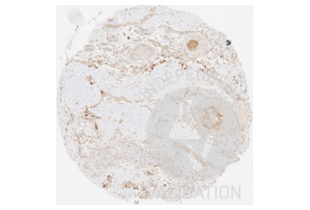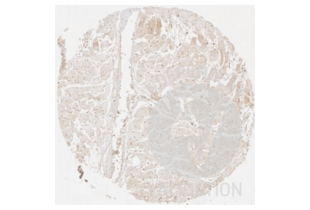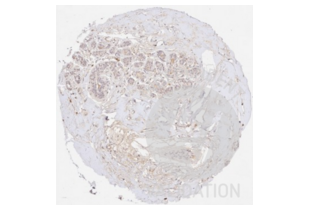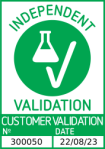COL3A1 antibody
-
- Target See all COL3A1 Antibodies
- COL3A1 (Collagen, Type III, alpha 1 (COL3A1))
-
Reactivity
- Human, Cow, Pig
-
Host
- Rabbit
-
Clonality
- Polyclonal
-
Conjugate
- This COL3A1 antibody is un-conjugated
-
Application
- Western Blotting (WB), Immunohistochemistry (IHC), ELISA, Immunoprecipitation (IP), Dot Blot (DB), Flow Cytometry (FACS), Fluorescence Microscopy (FM)
- Supplier Product No.
- 600-401-105-0.1
- Supplier
- Rockland
- Purpose
- Collagen Type III Antibody
- Cross-Reactivity (Details)
- Some class-specific anti-collagens may be specific for three-dimensional epitopes which may result in diminished reactivity with denatured collagen or formalin-fixed, paraffin embedded tissues.
- Characteristics
- Synonyms: rabbit anti-Collagen Type III antibody, Collagen type III alpha 1 antibody, Collagen type III alpha antibody, EDS4A antibody, Ehlers Danlos syndrome type IV, autosomal dominant antibody, Fetal collagen antibody, COL3A1, Collagen alpha-1 (III) chain
- Purification
- Collagen III Antibody has been prepared by immunoaffinity chromatography using immobilized antigens.
- Sterility
- Sterile filtered
- Immunogen
-
Immunogen: Collagen Type III from human and bovine placenta
Immunogen Type: Native Protein
- Isotype
- IgG
-
-
- Application Notes
-
Flow Cytometry Dilution: User Optimized
Immunohistochemistry Dilution: 1:50 - 1:200
Application Note: Anti-Collagen Type III has been tested by dot Blot, western blot, and IHC and is useful for indirect trapping ELISA for quantitation of antigen in serum using a standard curve, immunoprecipitation, native (non-denaturing, non-dissociating) PAGE, immunohistochemistry, and western blotting for highly sensitive qualitative analysis.
Western Blot Dilution: 1:1,000 - 1:10,000
Immunoprecipitation Dilution: 1:100
ELISA Dilution: 1:5,000 - 1:50,000
IF Microscopy Dilution: User Optimized
Other: User Optimized
- Restrictions
- For Research Use only
-
- by
- MS Validated Antibodies
- No.
- #300050
- Date
- 08/22/2023
- Antigen
- COL3
- Lot Number
- 47783
- Method validated
- Immunohistochemistry
- Positive Control
Human TMA
Mouse monoclonal anti-COL3 antibody clone FH-7A
rabbit monoclonal anit-COL3 antibody HL1906
- Negative Control
- Notes
Passed. The anti-COL3 antibody ABIN5596830 stains collagen III in formalin-fixed tissues consistently with expected staining pattern.
- Primary Antibody
- ABIN5596830
- Secondary Antibody
- EnVision Polymer-HRP mouse/rabbit Kit, Dako REAL, K5007
- Full Protocol
- Slide preparation
- Mount 2,5 µm FFPE tissue sections on superfrost slides.
- Deparaffinize tissue sections 3x 5 min in xylene.
- Rehydrate tissue sections in a descending ethanol series for 1 min each 100%, 96%, and 80% ethanol.
- Rinse tissue sections for 5 min in TBST buffer (DAKO, K8000).
- Epitope retrieval
- Autoclave tissue sections for 5 min at 121 °C in 1x Tris-EDTA-citrate buffer pH7.8 (20x Tris-EDTA-citrate buffer stock solution: 5 g Trizma base (Sigma-Aldrich, T1503), 10 g EDTA (Merck, 1.08418), 6.4g tri-sodium citrate (Sigma-Aldrich, C0909), adjust to pH 7.8 using HCL 1 M, ad 1 L with dH2O).
- Rinse tissue sections for 5 min in TBST buffer.
- Peroxidase blocking
- Incubate tissue sections for 10 min in Peroxidase-Blocking Solution (Dako REAL, S2023).
- Rinse tissue sections 2x for 5 min in TBST buffer.
- Antibody incubation
- o Dilute primary rabbit anti-collagen III antibody (antibodies-online, ABIN5596830, lot 47783) diluted 1:112.5, 1:225, or 1:450 in antibody diluent (Dako REAL, S2022).
- Cover tissue section with 100-200 µl diluted antibody.
- Incubate tissue sections for 1 h at 37 °C in a moist chamber.
- Rinse tissue sections for 5 min in TBST buffer.
- Apply EnVision Polymer-HRP mouse/rabbit Kit (Dako REAL, K5007) according to manufacturer’s recommendation.
- Rinse tissue sections 2x for 5 min in TBST buffer.
- Staining
- Cover slides for 10 min with DAB-Chromogen (EnVision Polymer-HRP mouse/rabbit Kit, Dako REAL, K5007).
- Wash slides thoroughly with dH2O.
- Counterstain for 15 sec with Hematoxylin (Mayers Hematoxylin: 200ml ddH2O, 0,2g Hematoxylin (Serva, 24420.02), 10 g aluminium potassium sulfate dodecahydrate (Merck, 1.01047), 0,04 g sodium iodate (Merck, 1.06525), 10 g chloral hydrate (Sigma-Aldrich, 15307)).
- Develop for 15 sec in H2O.
- Dehydrate tissue sections in an ascending ethanol series for 1 min each 80%, 96%, 100% ethanol.
- Wash tissue sectiona 3x 5 min in xylene.
- Apply mounting medium and coverslips.
- Image acquisition
- o Acquire images using a Galileo TMAtic (ISENET).
- Experimental Notes
For antibody comparison an antibody test TMA was used that contained 80 normal tissues from 21 different organs and 95 neoplastic tissues from 18 different tumor types.
The anti-COL3 antibody ABIN5596830 tends to cause a rather ubiquitous cytoplasmic staining of all kinds of cells including epithelial cells. This cytoplasmic staining is reduced to a tolerable level at dilutions of 1:225 and less. At such dilutions, ABIN5596830 stains fibrillar structures – also detected by the two reference antibodies - at weak to moderate intensity. Based on the identical staining pattern obtained by three different collagen III antibodies, these fibrillar staining’s are likely due to a binding of the antibodies to collagen III. Collagen III staining is typically located adjacent to epithelial structures, in smooth muscles or around vessels of all sizes, and in the stroma of tumors.
ABIN5596830 cross-reacts with some inflammatory cells in lymph nodes.
Validation #300050 (Immunohistochemistry)![Successfully validated 'Independent Validation' Badge]()
![Successfully validated 'Independent Validation' Badge]() Validation ImagesFull Methods
Validation ImagesFull Methods -
- Format
- Liquid
- Concentration
- 1.0 mg/mL
- Buffer
-
Buffer: 0.02 M Potassium Phosphate, 0.15 M Sodium Chloride, pH 7.2
Stabilizer: None
Preservative: 0.01 % (w/v) Sodium Azide - Preservative
- Sodium azide
- Precaution of Use
- This product contains Sodium azide: a POISONOUS AND HAZARDOUS SUBSTANCE which should be handled by trained staff only.
- Storage
- 4 °C,-20 °C
- Storage Comment
- Store vial at 4° C prior to opening. This product is stable at 4° C as an undiluted liquid. Dilute only prior to immediate use. For extended storage, mix with an equal volume of glycerol, aliquot contents and freeze at -20° C or below. Avoid cycles of freezing and thawing.
- Expiry Date
- 12 months
-
-
: "Keloid Pathogenesis: Potential Role of Cellular Fibronectin with the EDA Domain." in: The Journal of investigative dermatology, Vol. 135, Issue 7, pp. 1921-1924, (2015) (PubMed).
: "Overexpression of Twinkle-helicase protects cardiomyocytes from genotoxic stress caused by reactive oxygen species." in: Proceedings of the National Academy of Sciences of the United States of America, Vol. 110, Issue 48, pp. 19408-13, (2014) (PubMed).
: "Propolis Modifies Collagen Types I and III Accumulation in the Matrix of Burnt Tissue." in: Evidence-based complementary and alternative medicine : eCAM, Vol. 2013, pp. 423809, (2013) (PubMed).
: "The role of decorin and biglycan dermatan sulfate chain(s) in fibrosis-affected fascia." in: Glycobiology, Vol. 21, Issue 10, pp. 1301-16, (2012) (PubMed).
: "Genetic deletion of the angiotensin-(1-7) receptor Mas leads to glomerular hyperfiltration and microalbuminuria." in: Kidney international, Vol. 75, Issue 11, pp. 1184-1193, (2009) (PubMed).
-
: "Keloid Pathogenesis: Potential Role of Cellular Fibronectin with the EDA Domain." in: The Journal of investigative dermatology, Vol. 135, Issue 7, pp. 1921-1924, (2015) (PubMed).
-
- Target
- COL3A1 (Collagen, Type III, alpha 1 (COL3A1))
- Alternative Name
- COL3A1 (COL3A1 Products)
- Background
- Background: Collagens are highly conserved throughout evolution and are characterized by an uninterrupted ''Glycine-X-Y'' triplet repeat that is a necessary part of the triple helical structure. For these reasons, it is often extremely difficult to generate antibodies with specificities to collagens. The development of 'type' specific antibodies is dependent on NON-DENATURED three-dimensional epitopes. Rockland extensively purifies collagens for immunization from human and bovine placenta and cartilage by limited pepsin digestion and selective salt precipitation. This preparation results in a native conformation of the protein. Antibodies are isolated from rabbit antiserum and are extensively cross-adsorbed by immunoaffinity purification to produce 'type' specific antibodies. Greatly diminished reactivity and selectivity of these antibodies will result if denaturing and reducing conditions are used for SDS-PAGE and immunoblotting. Ideal for investigators involved in Cell Biology, Signal Transduction and Stem Cell research.
- Gene ID
- 1281
- NCBI Accession
- NP_000081
- UniProt
- P02461
- Pathways
- Autophagy, Growth Factor Binding
-





 (5 references)
(5 references) (1 validation)
(1 validation)




